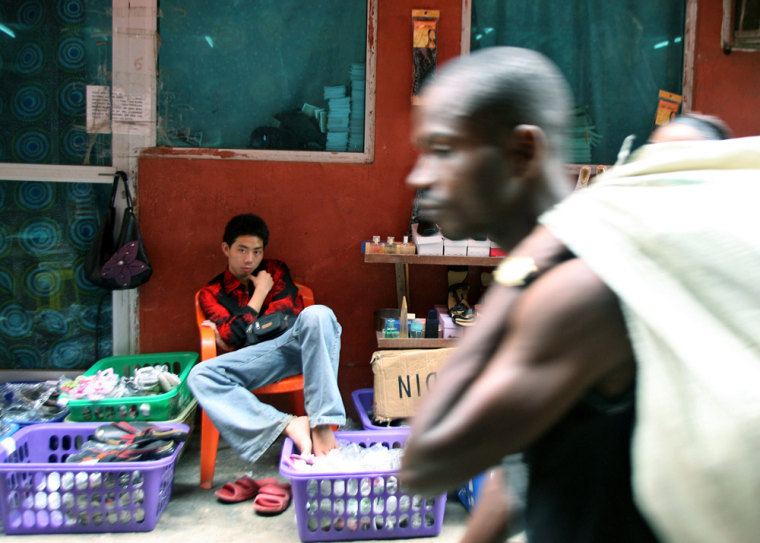When Chinese investors bought struggling copper producer Chambishi Mining Plc, miners in this Zambian town gave them a heroes’ welcome for averting its closure and for creating more jobs.
Three years on, resentment is rising openly against the new owners, NFC Africa, as workers complain about pay and conditions.
Last month miners destroyed property at the mine in a violent protest during which Chinese managers opened fire, wounding five workers, according to miners and police. Management denies this, blaming police for the shooting.
The Chambisi unrest is only the most serious demonstration of mounting anger over how Chinese firms do business as they spread their wings across the world’s poorest continent, which is hungry for foreign investment to create jobs.
Resentment growing
Complaints over cheap Chinese products swamping the continent, forcing local industries to close with catastrophic job losses, are common across Africa. Tensions over labor practices are relatively new but spreading.
From Angola to Nigeria and Morocco, resentment is overshadowing the euphoria that greeted Chinese investors, drawn mainly by Africa’s minerals to fuel China’s frenetic growth.
In countries like Angola, which is tapping its huge oil wealth to rebuild after nearly three decades of war, Chinese investment spans everything from oil concessions to construction of roads, railways and houses.
China’s Roads and Bridges Corporation is rehabilitating thousands of kilometers of roads over the next two to three years, using an oil-backed multi-billion dollar Chinese credit.
And China is pouring in tens of thousands of its own blue collar workers as well as the money.
“There is a lot of resentment,” said Joao Banga, head of the Ministry of Environment in Huambo in central Angola, where Chinese companies are rehabilitating the local railways.
“Any project associated with Chinese money is only obliged to contract 30 percent of it to domestic companies — in a country with some 80 percent unemployment.”
The fact that Chinese workers are kept in dormitory-style housing on the outskirts of town with little contact with the local people only adds to suspicion and prejudice.
Labor practices under fire
Some of the more common complaints against Chinese firms include poor pay, lack of safety clothing or boots for workers in textiles, copper and coal mining industries, and the use of short-term contracts as opposed to long-term employment.
In 2004 the Zambian government asked Chinese managers at Zambia-China Mulungushi Textiles Ltd, in northern Kabwe, to stop locking in workers at the factory at night.
And in June authorities shut down Collum Coal Mining Industries Ltd, in southern Zambia, saying miners had been forced to work underground without safety clothing and boots.
The government said the mine would re-open only after it was satisfied conditions had improved.
“The Chinese have annoyed us because they don’t treat us as important partners in their business,” said a Chambishi mine worwker who declined to be named.
“All they are interested in are higher profits and not the workers who earn them these profits,” added the miner, who was involved in the violent protest in July.
Union officials say miners at Chambishi are the lowest paid in the entire mining sector, with the least paid earning $100 a month. By comparison the lowest paid miner at the Konkola Copper Mines, Zambia’s largest copper producer, earns $424 monthly, they said.
Chambishi Mining’s company secretary Xu Ruiyong acknowledged some conditions of service were “not good.”
“We are favorable in certain conditions and, yes, some areas are unfavorable, but this is a matter for the management and the union to streamline,” Xu told Reuters.
Locals no match
Weak regulatory regimes in Africa are easy to exploit.
Lesotho’s department of trade says Chinese operators are licensed to operate only big retail shops or supermarkets, but in reality locally owned grocery stores have virtually disappeared.
“I had to close down my small shop because I’m now in competition with the big Chinese supermarket at the corner,” former store owner Thabo Seutloali told Reuters.
He said local people had rented their shops to the Chinese because “they get a better profit from rent than from running the shops themselves.”
Chinese business operators approached for comment said they could not speak English.
In Algeria, rebuilding after years of political violence, China has been quick to fill a skills gap in a country short of trained engineers, electricians, plumbers, carpenters and masons.
So far, Chinese firms have invested over $1.5 billion in various sectors and 7,000 Chinese work in Algeria.
Some Algerians resent them taking jobs but admit that the Chinese worker will be a feature of the labor market until Algeria improves its labor skills.
“If new investors are offered incentives to buy land and (are) exonerated from taxes on profits for the first few years, it’s so they give work to Moroccans,” said Abdelhalek Charibi of Moroccos’s textile industry association AMITH.
